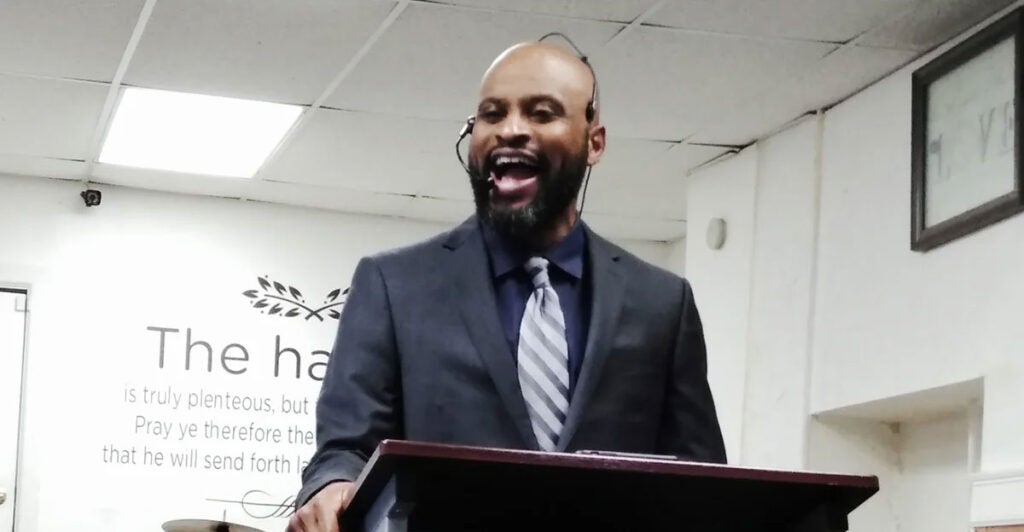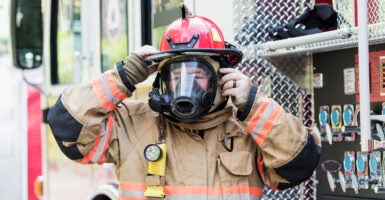For more than 20 years, Alex Smith has worked for the Atlantic City, New Jersey, Fire Department, dedicating his life to serving his hometown.
In his current position as air mask technician, he fits masks and refills air tanks for firefighters engaged in fire suppression—an important role to ensure their safety while fires are raging.
For more than 20 years, Smith has also served as an ordained minister. He leads Community Harvesters Church, a vibrant local ministry dedicated to showing the love of Christ to the community. He and his church host a food pantry and tend a community garden to offer food and fresh produce for the elderly and financially struggling families.

Alex Smith says his religious beliefs and conscience require him to wear a beard to set a godly example for his congregation and follow the examples of the prophets and Jesus in Scripture. (Photo: FirstLiberty.org)
The church also maintains a beautiful “tiny house” on church property for those in need of shelter.
His compassion also carries over to his fellow employees in the fire department. Smith serves as a chaplain in a program he started to provide a listening ear and spiritual support to those who regularly risk their lives to save others.
Smith’s religious beliefs and conscience require him to wear a beard to set a godly example for his congregation and follow the examples of the prophets and Jesus in Scripture.
Fire department policy, however, prohibits beards of any length.
Because Smith is an air mask technician and does not fight fires himself, he asked the city for a religious accommodation regarding his beard. After the city denied his request, he sued.
In 2023, a district court in New Jersey ruled for the city, concluding that accommodating Smith would be an “undue hardship” for the fire department because Smith could—hypothetically—be needed to fight a fire in the future. The district court ignored evidence that Smith had successfully passed a mask-fit test with his beard multiple times and that the masks used by the fire department are positive pressure masks, meaning that even if there were a slight leak, the firefighter still would not inhale any air contaminants.
But what constitutes an “undue hardship”?
The Supreme Court’s unanimous landmark ruling last year in Groff v. DeJoy determined “undue hardship” means a “substantial increased cost” to an operation or business, far more than the old de minimis standard courts often relied on.
Here, the city cannot show any increased costs because Smith’s beard would have no impact on his co-workers or his ability to safely do his job filling air tanks.
Other fire departments and the military have found ways to safely provide religious or medical accommodations to otherwise clean-shaven requirements. So, why does the city still deny Smith’s request for a religious accommodation, refusing to even engage him in discussions about how he could faithfully live out his beliefs on the job?
Smith has appealed the district court decision to the 3rd U.S. Circuit Court of Appeals.
He’s not alone in his conviction that he should not have to choose between his faith and his job. Recently, individuals and organizations representing a broad array of minority faiths filed six friend of the court briefs at the 3rd Circuit in Smith’s support, presenting the views of three Jewish organizations, the American Hindu Coalition, and two Sikh groups, as well as Muslim and Christian law professors and advocacy groups.
These briefs not only pointed out how the district court misapplied the law; they also highlighted a trend in other military, police, and fire department contexts toward safely accommodating religious beards, rather than excluding Sikhs, Muslims, and others from entire career paths.
Also voicing their support for Smith were four firefighters and paramedics—Jewish and Muslim—who in 2007 won a permanent injunction prohibiting Washington, D.C., from enforcing a requirement that they be clean-shaven. Now recently retired or nearing retirement, each worked for the District of Columbia’s fire department for more 30 years.
Some of these D.C. first responders regularly donned protective face masks and entered hazardous situations—something that Smith’s role does not even require. Their brief recounted their experience that first responders need not compromise their religious convictions to serve in the fire department.
Even though Smith doesn’t need to wear a mask to perform his job, Atlantic City still requires that he shave every day to keep his job. All the city’s concerns are hypothetical, but the harm to Smith from the city’s refusal to respect his faith is very real.
Given the robust protections of federal law and the Free Exercise Clause, as well as the experience of other fire departments safely offering religious accommodations to bearded employees, Smith should be allowed to continue to serve his community as an air mask technician while enjoying the religious freedom the law guarantees.
The Daily Signal publishes a variety of perspectives. Nothing written here is to be construed as representing the views of The Heritage Foundation.




























